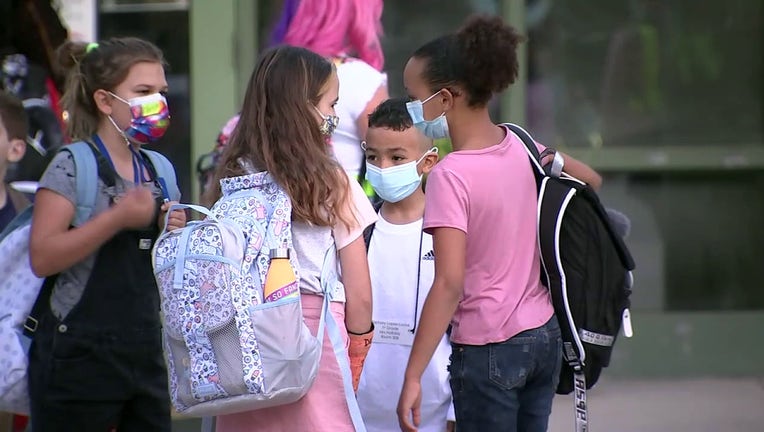Parents say stay in Florida mask case could cause 'irreparable harm'

Kids wear masks as they return to school in Hillsborough County in August of 2021.
TALLAHASSEE - Pointing to potential "irreparable harm," attorneys for a group of parents argued Thursday night that school districts should be able to require students to wear masks while an appeals court weighs a challenge to Gov. Ron DeSantis’ efforts to prevent mask mandates.
In a 33-page court filing, the parents’ attorneys urged the 1st District Court of Appeal to reject a request by the DeSantis administration to stay a circuit judge’s ruling that said the governor overstepped his constitutional authority in a July 30 executive order.
If the Tallahassee-based appeals court issues a stay, it could at least temporarily lead to school districts facing penalties if they require students to wear masks during the COVID-19 pandemic --- though some school districts have refused to comply with DeSantis’ efforts and said parents need to provide documented medical reasons for their children to avoid wearing masks.
The filing Thursday night said a potential stay creates "the very real prospect of irreparable harm" and pointed to the highly contagious delta variant of the coronavirus that has caused a spike in COVID-19 cases during the past two months.
"The evidence clearly shows that children have become infected exponentially since the spread of the delta variant this summer," the filing said. "This daily possible exposure to a more contagious COVID strain --- the delta variant --- in a school setting which allows parents to opt-out their children from wearing masks without any medical reason is an irreparable harm to appellees’ (the plaintiffs’) children. Appellees’ children have the option of either staying at home to avoid COVID, or they must go to school, which schools cannot require masks pursuant to the executive order, and expose themselves to COVID on a daily basis. Either option presents an irreparable harm to appellees’ children."
The filing was the latest move in a flurry of legal activity after a Sept. 2 ruling by Leon County Circuit Judge John Cooper against DeSantis, Education Commissioner Richard Corcoran, the Department of Education and the State Board of Education. The DeSantis administration appealed that ruling, a step that led to an automatic stay while the case was pending at the appeals court.
But the parents’ attorneys asked Cooper to vacate the stay, a request that he granted Wednesday. The DeSantis administration quickly returned to the appeals court with an emergency motion to reinstate the stay --- a move that led to the filing Thursday by the parents’ attorneys.
In the motion Wednesday night to reinstate the stay, attorneys for the state argued that they will ultimately prevail in the underlying issues in the lawsuit. They contended, in part, that Cooper violated constitutional separation of powers and delved into policy and political issues about whether schools should be allowed to require masks.
"The adequate level of safety in schools and other public settings is a political question reserved entirely for elected representatives who are publicly accountable," the motion said. "Therefore, in finding irreparable harm (from a stay of his ruling), the trial court should not have substituted its own health policy preferences or risk assessments for those of the governor or, more importantly, the state health officer and surgeon general."
It was not clear Friday morning how quickly the appeals court will decide whether to reinstate the stay or when it will consider the underlying issues in the lawsuit.
The group of parents filed the lawsuit Aug. 6, about a week after DeSantis issued the executive order. Following the executive order, the Florida Department of Health issued a rule that said parents should have the right to opt out of student mask requirements.
While DeSantis argues parents should be able to decide whether their children wear masks, some districts have bucked the executive order and Department of Health rule, only allowing students to forgo masks if their parents present documented medical reasons. That has led to Corcoran pursuing financial penalties against districts that have approved such policies.
In siding with the parents, Cooper in the Sept. 2 ruling said DeSantis overstepped his authority, He also cited a new state law known as the "Parents’ Bill of Rights," which deals with parents’ right to control health and educational decisions for their children. Cooper said Corcoran and the Department of Education improperly imposed financial penalties on districts that enact mask mandates without giving the districts due process.
"The law of Florida does not permit the defendants to punish school boards, its members, or officials for adopting face mask mandates with no parental opt-outs if the schools boards have been denied their due process rights under the Parents’ Bill of Rights to show that this policy is reasonable and meets the requirements of the statute," Cooper wrote.
In the motion filed Wednesday night, the state’s lawyers pushed back against the judge’s conclusions involving the Parents’ Bill of Rights.
"According to its plain terms, the Parents’ Bill of Rights limits governmental authority and protects the inherent rights of parents," the motion said. "Thus, the governor could not possibly have violated the Parents’ Bill of Rights by protecting parents’ rights. Most assuredly, the Parents’ Bill of Rights does not grant any authority to local school districts that did not previously exist."
But attorneys for the plaintiffs disputed the state’s arguments in the filing Thursday.
"The Parents’ Bill of Rights expressly gives governmental entities, such as school boards, the right to adopt policies regarding health care and education of children in school, even if the policies affect a parent’s rights to make decisions in these areas, as long as the governmental agency can show that the policy is reasonable and necessary to achieve a compelling state interest, and that the policy is narrowly tailored and not otherwise served by a less restrictive means," the filing said.

